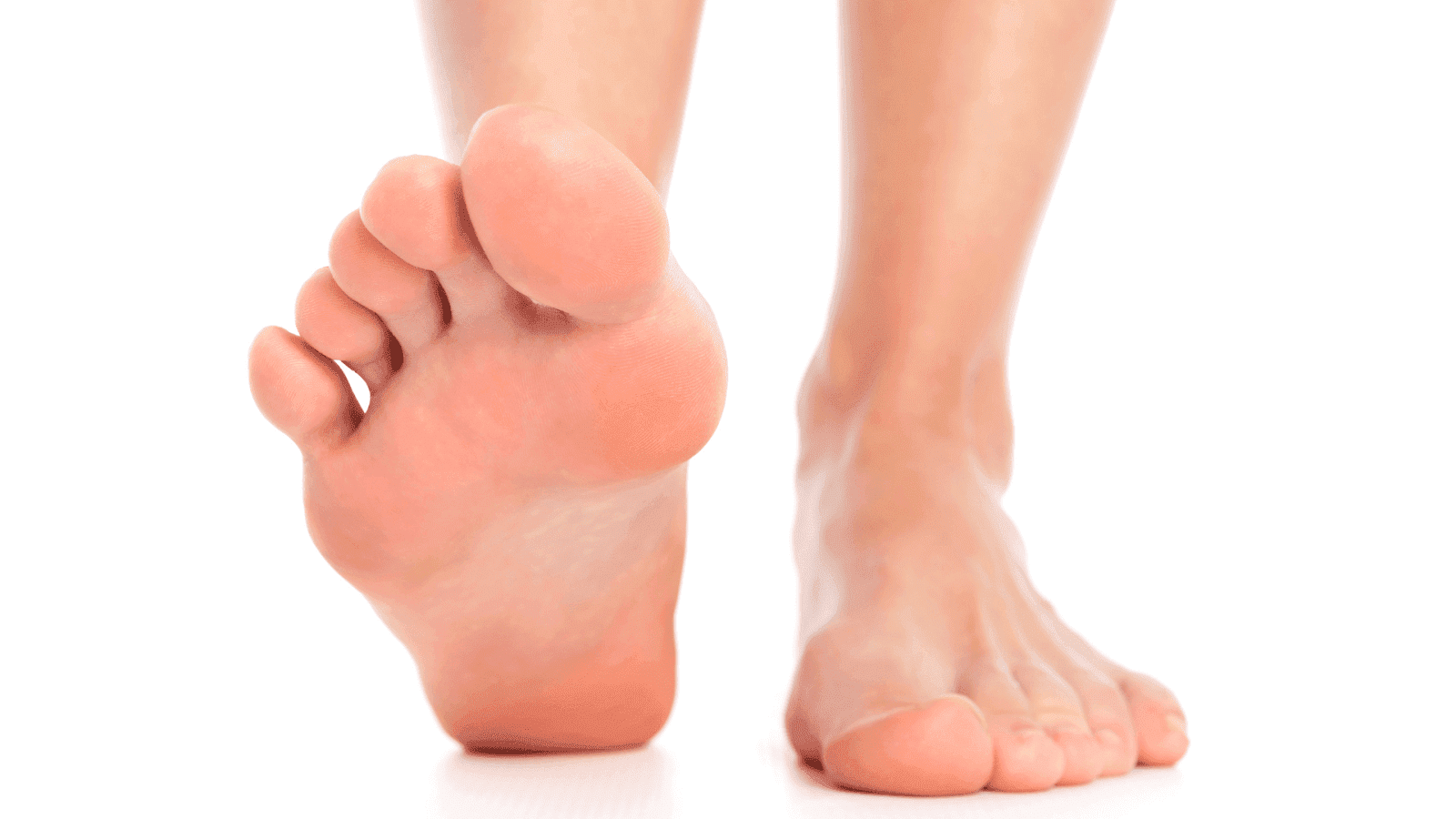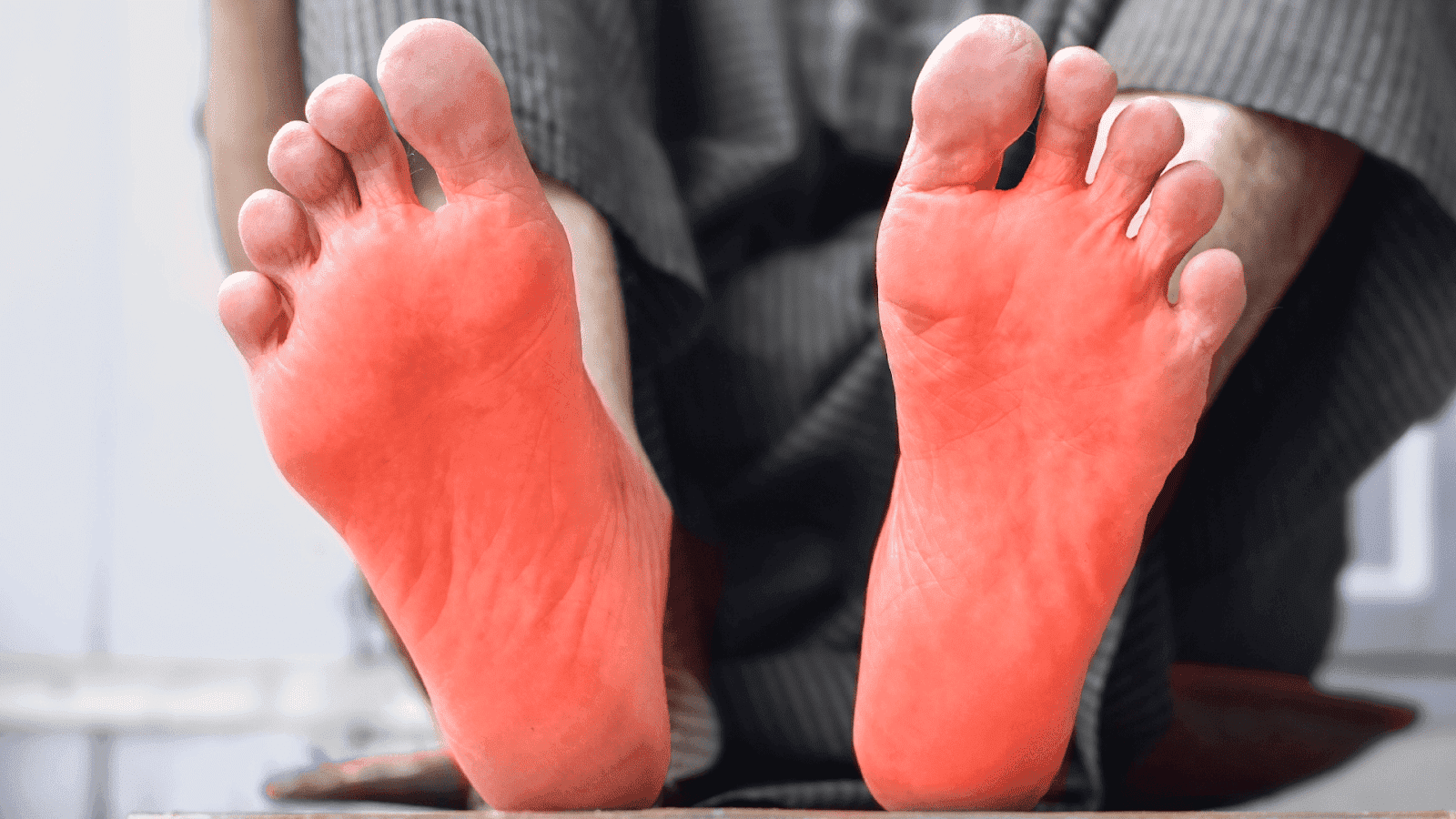Experiencing a burning sensation in your feet can be distressing, especially when it disrupts your sleep or daily activities. This uncomfortable feeling can range from mild irritation to intense pain, often described as tingling, numbness, or a sensation of heat. Understanding the underlying causes is crucial to finding relief and preventing further complications. This article delves into the common and less common reasons behind burning feet, how to recognize symptoms, and when to seek medical advice. Plus, discover how modern telehealth services like Doctronic.ai can provide fast, personalized care from the comfort of your home.
 What Is Burning Feet Syndrome?
What Is Burning Feet Syndrome?
Burning Feet Syndrome, also known as Grierson-Gopalan syndrome, is characterized by a persistent burning sensation in the soles of the feet. This condition can affect one or both feet and may extend to the toes or even the lower legs. The sensation is often worse at night, leading to sleep disturbances and impacting quality of life.
While burning feet can be a standalone symptom, it frequently signals an underlying medical issue. Identifying the root cause is essential for effective treatment. The causes can be neurological, metabolic, infectious, or even related to lifestyle factors.
Neurologically, conditions such as peripheral neuropathy, which can arise from diabetes or vitamin deficiencies, are common culprits. These conditions disrupt the normal functioning of nerves, leading to abnormal sensations. Metabolic disorders, including hypothyroidism or diabetes, can also contribute to the development of burning feet syndrome by affecting blood flow and nerve health. Furthermore, certain infections, such as those caused by fungi or viruses, can lead to inflammation and nerve irritation, exacerbating the burning sensation.
Lifestyle factors play a significant role as well. Prolonged standing, wearing ill-fitting shoes, or exposure to extreme temperatures can aggravate the symptoms. Additionally, individuals who lead a sedentary lifestyle may experience reduced circulation, which can further intensify the burning sensation. Stress and anxiety have also been linked to heightened perceptions of pain, making it crucial to address both physical and emotional health when managing this syndrome.
Common Causes of Burning Feet
1. Peripheral Neuropathy
Peripheral neuropathy is one of the most prevalent causes of burning feet. It refers to damage or dysfunction of the peripheral nerves, which transmit signals between the central nervous system and the rest of the body. When these nerves are impaired, they can send faulty pain signals, resulting in burning, tingling, or numbness.
Diabetes is the leading cause of peripheral neuropathy. High blood sugar levels damage nerves over time, particularly in the feet and hands. According to the Centers for Disease Control and Prevention (CDC), nearly 50% of people with diabetes experience some form of neuropathy. This makes diabetic neuropathy a significant contributor to burning feet sensations.
Other causes include chronic alcohol abuse, vitamin deficiencies (especially B vitamins), exposure to toxins, certain medications, and autoimmune diseases like lupus or rheumatoid arthritis. Additionally, conditions such as hypothyroidism and certain infections can exacerbate nerve damage, leading to increased discomfort. It's essential for individuals experiencing these symptoms to consult healthcare professionals for accurate diagnosis and treatment options.
2. Vitamin Deficiencies
Deficiencies in vitamins such as B12, B6, and E can lead to nerve damage and burning sensations in the feet. Vitamin B12 deficiency, in particular, is notorious for causing neuropathic symptoms because it is vital for maintaining healthy nerve cells.
People with poor dietary intake, malabsorption disorders like celiac disease, or those on certain medications (e.g., metformin) are at risk of developing these deficiencies. Early detection and supplementation can reverse symptoms in many cases. Furthermore, a balanced diet rich in whole grains, lean proteins, and leafy greens can help prevent these deficiencies and promote overall nerve health. Regular blood tests can also be beneficial for monitoring vitamin levels, especially in at-risk populations.
3. Tarsal Tunnel Syndrome
Tarsal tunnel syndrome occurs when the tibial nerve is compressed as it passes through the tarsal tunnel near the ankle. This compression can cause burning pain, tingling, or numbness in the sole of the foot. It is similar to carpal tunnel syndrome in the wrist, but affects the foot instead.
Causes include injury, swelling from arthritis, or anatomical abnormalities. Wearing tight or ill-fitting shoes can exacerbate symptoms. In some cases, repetitive activities or overuse can lead to inflammation in the tarsal tunnel, increasing pressure on the nerve. Physical therapy and orthotic devices can provide relief by improving foot mechanics and reducing strain on the affected area.
4. Athlete’s Foot and Other Infections
Fungal infections like athlete’s foot can cause itching, burning, and redness between the toes and on the soles. While usually superficial, untreated infections can lead to more severe discomfort and secondary bacterial infections.
Other infections, such as erythromelalgia, cause redness and burning sensations due to inflammation of blood vessels in the feet. Additionally, conditions like cellulitis, a bacterial skin infection, can also present with similar symptoms. Maintaining proper foot hygiene, wearing breathable footwear, and avoiding walking barefoot in public areas can help prevent these infections. If symptoms persist, seeking medical attention is crucial to prevent complications.
5. Chronic Kidney Disease
Kidney dysfunction can lead to the accumulation of toxins in the blood, which may damage nerves and cause burning feet. This condition, known as uremic neuropathy, is more common in advanced stages of kidney disease. Patients may also experience other symptoms such as fatigue, swelling, and changes in urination patterns, which can indicate worsening kidney function.
Management of chronic kidney disease often involves dietary modifications, medication, and sometimes dialysis. Regular monitoring of kidney function through blood tests is essential for early detection and intervention. Additionally, staying hydrated and following a kidney-friendly diet can help mitigate some symptoms associated with nerve damage.
6. Hypothyroidism
Underactive thyroid glands can cause fluid retention and nerve swelling, leading to burning sensations in the feet. Hypothyroidism also slows metabolism, which can contribute to nerve damage over time. Symptoms may include fatigue, weight gain, and sensitivity to cold, all of which can impact overall quality of life.
Diagnosis typically involves blood tests to measure thyroid hormone levels. Treatment usually consists of hormone replacement therapy, which can alleviate symptoms and restore normal metabolic function. Regular follow-ups with healthcare providers are essential to ensure that thyroid levels remain stable and to adjust medication dosages as necessary.
Less Common but Important Causes
1. Erythromelalgia
Erythromelalgia is a rare condition characterized by episodes of burning pain, redness, and warmth in the feet and hands. These episodes can be triggered by heat, exercise, or stress. The exact cause is not well understood, but it may involve nerve or blood vessel dysfunction.
2. Small Fiber Neuropathy
This type of neuropathy affects the small nerve fibers responsible for pain and temperature sensation. It can cause burning pain, often without significant weakness or numbness. Small fiber neuropathy can be idiopathic or associated with autoimmune diseases, diabetes, or infections.
3. Chemotherapy-Induced Neuropathy
Certain chemotherapy drugs can cause peripheral nerve damage, leading to burning sensations in the feet and hands. This side effect can persist long after treatment ends and significantly affect quality of life.
When to See a Doctor for Burning Feet
While occasional burning sensations might be harmless, persistent or worsening symptoms warrant medical evaluation. Seek medical attention if you experience:
Burning pain lasting more than a few days
Numbness or weakness in the feet
Difficulty walking or balance problems
Signs of infection such as redness, swelling, or open sores
Associated symptoms like weight loss, fever, or night sweats
Early diagnosis can prevent complications and improve outcomes. A healthcare provider will typically perform a physical examination, review your medical history, and order tests such as blood work, nerve conduction studies, or imaging to determine the cause.
 How Modern Telehealth Can Help You Manage Burning Feet
How Modern Telehealth Can Help You Manage Burning Feet
Accessing timely medical care for burning feet symptoms can be challenging, especially if you have a busy schedule or live far from specialists. This is where telehealth services shine by offering convenient, affordable, and fast medical consultations from home.
Doctronic.ai is revolutionizing direct-to-patient care by providing AI-powered doctor visits that are free and available 24/7. With over 10 million users, Doctronic combines the latest peer-reviewed medical research with personalized AI to deliver comprehensive answers and treatment recommendations in seconds.
Whether you have questions about your symptoms or need a second opinion, Doctronic’s AI doctor remembers your history and provides tailored advice. For more in-depth care, you can also schedule inexpensive telehealth video visits with licensed doctors across all 50 states for under $40. This blend of AI and human expertise ensures you receive quality care quickly without leaving your home.
Tips for Managing Burning Feet at Home
While professional evaluation is essential, there are several steps you can take to alleviate burning feet symptoms at home:
Foot Care: Keep your feet clean and dry, especially between the toes, to prevent infections.
Proper Footwear: Wear comfortable, well-fitting shoes with good arch support to reduce pressure on nerves.
Manage Blood Sugar: If you have diabetes, maintain good blood sugar control to prevent neuropathy progression.
Vitamin Intake: Ensure adequate intake of essential vitamins, particularly B-complex vitamins, through diet or supplements.
Avoid Alcohol: Excessive alcohol can worsen nerve damage.
Cool Compresses: Applying cool packs can soothe burning sensations temporarily.
However, these measures do not replace professional diagnosis and treatment. Persistent or severe symptoms require prompt medical attention.
Your Step Toward Foot Pain Relief Starts Here
Burning feet can stem from a variety of causes, ranging from common conditions like diabetic neuropathy and vitamin deficiencies to rarer disorders such as erythromelalgia. Recognizing the symptoms and understanding the potential underlying issues is the first step toward relief.
With advances in healthcare technology, accessing expert advice has never been easier. Doctronic.ai offers fast, personalized AI-powered consultations and affordable telehealth visits, making quality care accessible anytime, anywhere.
If burning feet are keeping you up at night, don’t suffer in silence. Seek medical advice promptly to identify the cause and start effective treatment. Your feet carry you through life; taking care of them is essential for your overall well-being.
Get Immediate Help for Your Burning Feet with Doctronic
If the discomfort of burning feet is affecting your daily life, it's time to take action. Doctronic, the #1 AI Doctor, offers you a revolutionary way to address your health concerns quickly and personally. With our AI-powered consultations, you'll receive immediate, comprehensive answers based on the latest medical research, tailored just for you. And if you need to speak with a doctor, our telehealth video visits are available 24/7 in all 50 states, at an affordable price. Don't wait in discomfort and talk to an AI Doctor now, for free. Take the first step towards relief.



 What Is Burning Feet Syndrome?
What Is Burning Feet Syndrome? How Modern Telehealth Can Help You Manage Burning Feet
How Modern Telehealth Can Help You Manage Burning Feet